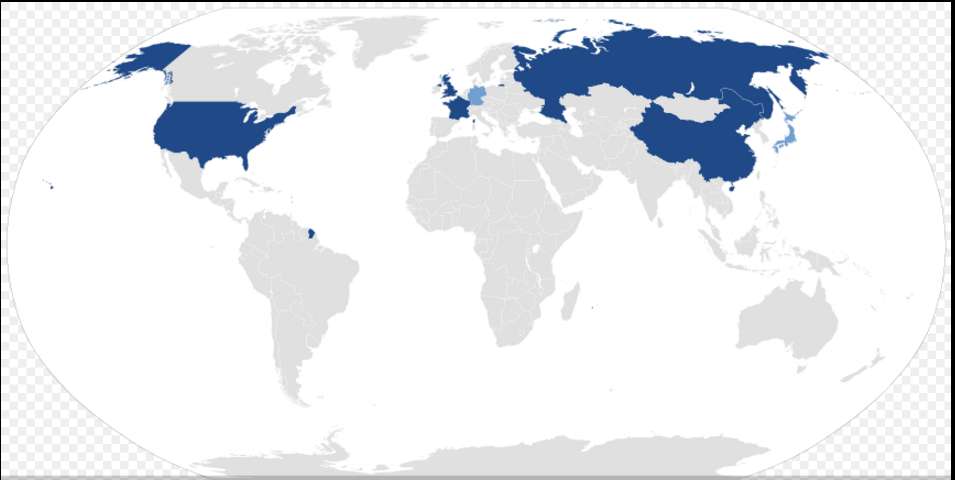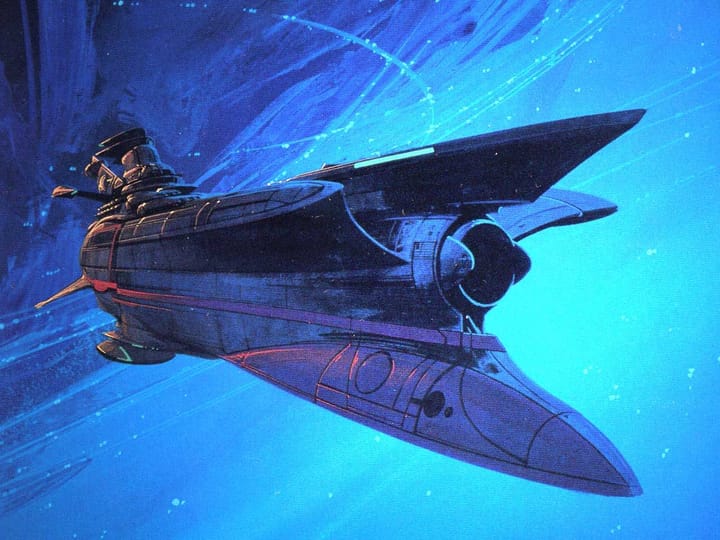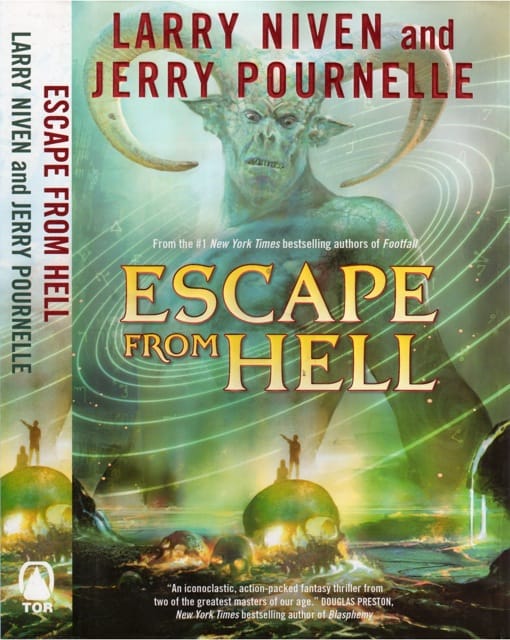The Long View 2004-10-05: Art & Empire
In the years since this was written, the shifting of politics from a left/right axis to a globalist/nationalist axis has continued.
In the last paragraph, John noted that the attempt of the US to continue to function as a sovereign nation in the Great Power/Treaty of Westphalia sense probably wouldn't work, since only the US was capable of really doing that at the time. In the years since, I think we have seen an increasing attempt by other nations to do just that. Most of these players are still the "Great Powers" of the twentieth century, the parties to the Second World War.

By NuclearVacuum - File:BlankMap-World6.svgi, CC BY-SA 3.0,
In the immediate aftermath of 9/11, it was common on the American Right to make fun of the French, but then as now the French continue to project power into it's former colonies and current overseas departments. The United Kingdom does the same.

Art & Empire
I see that the candidates for the American presidency are still up to their tomfoolery. I will, of course, make further remarks on the matter in the future, but the fact is that the Kerry Campaign is impervious to good luck. Is there really much more to say?
* * *
Meanwhile, the New York Times Magazine had an article by Arthur Lubow in its October 3 issue on a really important subject:
Defined for so long as the arbiter and guardian of progressive art, [New York's Museum of Modern Art, a.k.a. "MOMA"] reopens on Nov. 20 -- its 75th birthday -- at a time when even its own curators no longer believe that art progresses like science.
This insight is not new. However, the institutions that have supported modern art for a century were designed with a teleological view of cultural history.
[Alfred H. Barr Jr. was MOMA's director at its founding in 1929.] The who is credited or vilified as the Great Codifier is Barr's successor at managing the collection, William Rubin. Unlike Barr, Rubin -- who was chief curator of P&S for 20 years -- had few scruples about sidelining work that he deemed minor. Along with many art scholars of the time, he had been heavily influenced by the critic Clement Greenberg, a lapsed Marxist who transposed his old political faith (in the inexorable evolution of capitalist society toward socialism) into a formalist canon marked by a similarly inevitable progress (from the Post-Impressionism of Cézanne to the Cubism of Braque and Picasso and onward to the Abstract Expressionism of Pollock, Barnett Newman and Clyfford Still). Although Barr also had an evolutionary way of thinking, he conscientiously kept his mind open. Because he was operating at a time when modernism was still fresh, that was easier to do. Under Rubin, the creed became dogma. Cerebral and increasingly abstract art was the mainstream, and the subordinate currents, if shown, were to be displayed off to the side.
The rhetoric of arts funding continues to speak in terms of novelty and exploration. And there is no consensus on a substitute language:
The concept of modernism is famously difficult to define. Unquestionably, though, one of the basic tenets of modernist art is a subordination of the putative subject matter (the person in a portrait or the mountain in a landscape) to the peculiarities of the medium (the application of paint to a flat canvas or the relationship between a sculpture and its pedestal). For MOMA to present its modernist masterpieces thematically was as shocking to some as it would be if the Catholic Church were to classify its relics by blood type.
Perhaps I have read The Glass Bead Game too many times, but I wonder that anyone should find this turn of events surprising. The interesting question is whether anything like the 20th-century art industry will long survive in the 21st. No doubt fashion objects will continue to be produced. They will not command anything like the residual religious deference that art commanded early in the modern era.
* * *
Along with art, the international system is continuing its transition from modernity, as we see in John O'Sullivan's piece in The New Criterion of October 2004, Gulliver's travails: The U.S. in the post-Cold-War world.
One of the pleasures of global political theory is that the subject's colorful nomenclature proliferates almost as fast as nuclear weapons. O'Sullivan gives us a brief vocabulary drill:
Kenneth Minogue calls this structure of governance "Acronymia" after the UNOs and NGOs that constitute it. He credits the present author with giving the name "Olympians," after the gods of Antiquity, to those who administer it. Ancient gods used to "kill us for their sport," but modern Olympians are content to regulate and preach at us. John Fonte has defined the common ideology they preach as "transnational progressivism": national sovereignty and the nation-state are disappearing in favor of a new structure of international organizations and rules that goes by the slippery name of "global governance."
O'Sullivan's premise is not entirely novel. After the Cold War, the United States was like the unconscious Gulliver on the beach of Lilliput. Gulliver was systematically tied down by the Lilliputians as he slept. Similarly, for a decade the US was being entwined in the devices and conventions of the transnationalists. Then, on 911, the US woke up. The purpose of O'Sullivan's article is to assess the situation during the Iraq War, which is not going frictionlessly:
Here was where the Tranzis began to make a comeback from their slide into irrelevance after September 11. The rest of the world wanted to see the sole remaining superpower subject to some other authority when it intervened elsewhere. As a practical matter the United States was unable to confer legitimacy upon its own actions. But the Tranzis are partly in the business of conferring it on international actions from their various legal, charitable, and political perches in Acronymia.
To this I would remark that the tranzi attempt to commandeer the situation has not gone frictionlessly, either. The Olympians can shower all the legitimacy they please upon their favorites: the fact remains that their edicts have no effect in areas without the basic police and administrative machinery that, so far, only states can provide. The tranzis are aware of this, which explains the amount of hope they place in the model tranzi institution, the European Union:
If, however, a giant inhabitant of Brobdingnag were to come to [the Lilliputians'] assistance, Gulliver would be defeated. Can the Tranzis hope for similar assistance?...If the United States is to defeat the terrorists in war or the Tranzis in international politics, it will have to take on the E.U. first. It is likely that this clash will occur most substantially over the war on terror.
This looks like a recipe for a low-intensity civil war within the West:
If, however, Mr. [Mark] Steyn is right in his pessimism -- and that's the way to bet -- then the United States will face a difficult future as a military superpower continually frustrated in middling matters by the resistance of international bodies. Europe and America will divide into two separate civilizations -- the Anglosphere (minus England, plus India) and the Holy Secular Empire -- uncomfortably housing a growing Muslim minority. Even in America, liberal democracy will be gradually transformed into a politically correct judicial oligarchy on Tranzi lines.
That might be a plausible future, if the transnational machinery worked. However, as we see in the UN's reaction to the genocide in Dafur, global governance remains what Kurt Vonnegut called a "granfalloon." And as O'Sullivan points out, "American" attitudes toward security issues are not hard to find in Europe. Similarly, tranzi notions have long been at home in the US. If there is convergence, it may not be to a tranzi Omega Point:
But there is another possibility rooted in the fact that the first reactions of most people to a violent but distant revolution are generally appeasing -- vide the reactions of almost everyone except Burke and Churchill to the French and Nazi revolutions respectively. Only when it becomes clear that the terrorists’ aims are limitless and that nobody is safe does opinion turn harsher and more realistic.
I can only repeat that what has been going on since the end of the Cold War is the search for the focus of legitimacy within the international system. The US insistence on sovereignty in its 19th-century Great Power form is not going to work, since the US is the only power in the world capable of functioning in that fashion. On the other hand, Acronymia unites hypocrisy with incompetence most wonderfully. The synthesis of this dialectic, when it occurs, is going to have to combine legitimacy with capability.
Copyright © 2004 by John J. Reilly



Comments ()